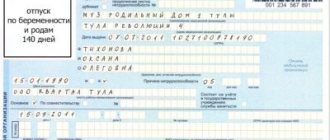Legislative justification
The employee continues his work activity while on a business trip. His work does not stop. Therefore, filing a sick leave during a business trip is a completely legitimate event. That is, payments on a certificate of incapacity for work are also legal.
The standards that need to be taken into account when organizing business trips are contained in Government Decree No. 749 of October 13, 2008. Paragraph 13 of this Resolution establishes that daily allowances must be paid throughout the entire duration of the business trip. Even if a person goes on sick leave, he will still receive daily allowance.
A trip on behalf of the employer presupposes that the employee retains both his workplace and his average salary. The employer must also reimburse the employee's expenses. For these purposes, daily allowances are paid. The corresponding provision is contained in Article 167 of the Labor Code of the Russian Federation.
The specifics of issuing a certificate of incapacity for work are regulated by Order of the Ministry of Health and Social Development No. 514. You need to pay attention to this regulation if an employee is sent on a business trip to another country. Paragraph 8 of the Order establishes that an employee, while on a business trip abroad, can receive sick leave from a foreign clinic. This sheet is exchanged for a Russian document upon arrival in the country.
The accrual of personal income tax on payments for sick leave received on a business trip is regulated by paragraph 1 of Article 210 and Article 217 of the Tax Code of the Russian Federation.
Got sick. What to do?
Anyone can get sick. The fact that a posted person lives in another city and, accordingly, is attached to a medical institution located in this locality does not deprive him of the right to receive medical care. Remember that you have the right to health care and medical care, which is provided to citizens free of charge in state and municipal health care institutions at the expense of the corresponding budget, insurance premiums, and other revenues (Article 41 of the Constitution of the Russian Federation). Refusal to provide medical care in accordance with the program of state guarantees of free provision of medical care to citizens and charging for its provision by a medical organization participating in the implementation of this program and by medical workers of such a medical organization are not allowed. Also, medical institutions are obliged to provide emergency medical care immediately and free of charge (Article 11 of the Law of November 21, 2011 No. 323-FZ “On the fundamentals of protecting the health of citizens in the Russian Federation”). That is, if a posted employee falls ill in another city, he has the right to receive medical care and, accordingly, a certificate of temporary incapacity for work.
Attention!
When going on a business trip, along with other documents, do not forget to take a medical insurance card with you.
Treatment can take place on an outpatient or inpatient basis. The posted person should remember that in the case of inpatient treatment, living expenses are not subject to reimbursement, since he will be in a medical institution around the clock (clause 25 of Regulation No. 749, clause 14 of Order No. 813). Therefore, in order to avoid unreasonable expenses, the employee must vacate the leased premises during his stay in the hospital (hospital). Otherwise, during his stay in the hospital, he will have to pay for rented housing (hotel) at his own expense.
Every employee (and not only business travelers) must remember that he is obliged to immediately notify the employer of illness and inability to perform his work duties. Failure to comply may result in dismissal. A similar case was considered in the St. Petersburg City Court - the employee did not go on a business trip due to poor health, did not notify the employer in a timely manner, did not explain the reasons for refusing to go on a business trip, and received a certificate of incapacity for work only the next day, due to than he was fired on the basis of subparagraph “a” of paragraph 6 of part 1 of Article 81 of the Labor Code, that is, for absenteeism. The court confirmed the legality and justification of the dismissal.
In the appeal, the employee, disagreeing with the dismissal, indicated that his health condition on the specified working day prevented him from performing his job duties, namely, going on a business trip, but did not provide indisputable evidence of this. Under such circumstances, the court had no reason to believe that due to health reasons the employee was deprived of the opportunity to perform his job duties, nor was he deprived of the opportunity to see a doctor for medical help, and therefore the plaintiff did not provide evidence that the absenteeism took place for a good reason presented. The St. Petersburg City Court, having examined the appeal against the decision of the Petrogradsky District Court of St. Petersburg dated September 7, 2012, in its ruling dated November 21, 2012 No. 33-15901, supported the earlier verdict and confirmed the legality of the dismissal.
An employee who falls ill on a business trip has the right to temporarily not perform his or her job duties and receive medical care. Based on the current situation, after recovery, the employee can go home or continue his stay on a business trip. If the business trip is long enough and the employee, after recovery, performs an official task, then he has the right to send a closed certificate of incapacity to work to the employer so that he can calculate and transfer benefits.
For persons on business trips abroad, this action is not available. The foreign medical documents they receive must be legalized and exchanged for a Russian-style certificate of incapacity for work. And the seconded employee will be able to do this only upon arrival home.
Legalization of foreign documents
While on a business trip abroad, an employee who feels unwell also has the right to receive a certificate of temporary incapacity for work. However, such a document will not be the basis for payment of disability benefits. It can be assigned and paid only on the basis of a certificate of incapacity for work issued and executed according to Russian rules (Part 5, Article 13 of Law No. 255-FZ). To receive it, the employee must contact a Russian medical institution (for example, a clinic at his place of residence), presenting foreign medical documents about illness or injury abroad, which must contain the employee’s personal data, the period of illness, the name of the medical organization, sealed with the seal of the medical institution (clinics). The decision to replace a foreign document with a Russian-style certificate of incapacity for work is made by a medical commission (clause 7 of the Procedure for issuing certificates of incapacity for work, approved by Order of the Ministry of Health and Social Development of Russia dated June 29, 2011 No. 624n (hereinafter referred to as Procedure No. 624n)).
Before contacting a medical institution to exchange foreign medical documents confirming temporary disability for a Russian-style temporary disability certificate, they must be legalized. The FSS of the Russian Federation, in letter dated July 6, 2005 No. 02-18/06-6048, clarified the issue of the use of foreign official documents on the territory of the Russian Federation, submitted for the purpose of providing compulsory social insurance against industrial accidents and occupational diseases (hereinafter referred to as the Letter No. 02-18/06-6048).
Three options for action can be distinguished, which depend on the status of the country that issued the document (the list of states belonging to one or another category is presented on the website https://www.kdmid.ru):
- notarize the translation of documents into Russian;
- affix an apostille1 on foreign documents;
- carry out consular legalization of documents.
A notarially certified translation
The first option includes documents issued in countries that have concluded bilateral agreements on the provision of legal assistance, to which the Russian Federation is a party. In particular, this is the Convention on Legal Assistance and Legal Relations in Civil, Family and Criminal Cases, concluded on January 22, 1993 in Minsk by the CIS member states (hereinafter referred to as the Convention). Article 13 of the Convention states that documents produced or certified in the prescribed form and affixed with an official seal in the territory of one country are accepted in the territory of other countries without any special identification. Documents that are considered official in the territory of one of the states enjoy the evidentiary value of official documents in the territory of other states that have signed the Convention.
In the CIS countries, the Agreement of the governments of the member states of the CIS countries of March 27, 1997 “On the provision of medical care to citizens of the member states of the Commonwealth of Independent States” (hereinafter referred to as the Agreement) is also in force. In accordance with paragraph 8 of the Agreement, a medical institution of a CIS member state issues a document certifying the temporary disability of citizens due to illnesses and injuries. This certificate of incapacity for work is recognized by all CIS member states. Subsequently, it is replaced by the medical institution to which the posted employee is attached with a certificate of temporary incapacity for work of the standard adopted in Russia.
Before going to the clinic to exchange foreign documents for a Russian-style temporary disability certificate, the employee only needs to make a notarized translation into Russian.
Apostille
For states that have signed the Convention Abolishing the Requirement for Legalization of Foreign Public Documents, concluded in The Hague on October 5, 1961 (hereinafter referred to as the Hague Convention), proof of authenticity will be an apostille affixed to the document by the competent authority of the state in which the document was issued. The apostille is affixed on the document itself or on a separate sheet attached to the document. It may be drawn up in the official language of the issuing authority. The points contained in it can also be stated in a second language. The heading “Apostille (Convention de la Haye du 5 October 1961)” must be given in French (Article 4 of the Hague Convention).
Thus, if a citizen falls ill while on the territory of a country that has signed the Hague Convention, then he must be issued a medical document accepted in this state, certified by an apostille stamp by the competent authority. After an apostille is affixed to foreign medical documents, the employee needs to make a notarized translation into Russian. Then he will be able to exchange them at a medical institution for a certificate of incapacity for work of the standard standard in the Russian Federation.
Consular legalization
For countries that are not subject to bilateral agreements and are not parties to the Hague Convention, the legalization of documents is carried out through consular legalization. Its order is established:
Law of July 5, 2010 No. 154-FZ “Consular Charter of the Russian Federation”;
Administrative regulations for the provision of public services for consular legalization of documents, approved by Order of the Russian Ministry of Foreign Affairs of June 18, 2012 No. 9470.
Documents can be legalized in the territory of the state where they were issued. To do this, they must be certified by the Ministry of Foreign Affairs or another authorized body of the state in whose territory the document was issued, and then legalized by the consular service of the Russian Federation located in this state.
When legalized on the territory of Russia, a foreign document is certified by the diplomatic mission or consular office of the state where it was issued, and then confirmed by the Department of Consular Service of the Ministry of Foreign Affairs of Russia.
Attention!
Regardless of the option of legalizing a medical document issued abroad, before presenting it to a medical institution in Russia to replace it with an approved certificate of incapacity for work, it is necessary to make a notarized translation into Russian. The costs of paying for the service are borne by the interested party (employee). These expenses are not subject to compensation or reimbursement.
Business trip extension
If an employee gets sick during a business trip, the employer faces two problems: factual and related to registration. The actual problem is that a sick specialist may not have time to complete all of his work tasks. The disease can be severe. In this case, the employee may even be sick for the entire business trip. That is, there is a need to extend it. You can extend your trip for any number of days. It all depends on the agreement between the employer and the employee.
How can I extend my trip? The head of the organization needs to issue an order. The document is drawn up in free form. But it must contain mandatory details:
- The reason why the business trip is being extended.
- Date of completion of the trip, taking into account the extension.
A copy of the order is sent to the employee. This must be done immediately after the order is issued. That is, the corresponding need arises when the employee is still on a business trip. To send an order conveniently and quickly, you can use fax or email. Another option is to send a telegram with acknowledgment of delivery.
Please keep in mind that sometimes it is necessary to request the employee's permission for an extension. Permission must be obtained in writing. This is relevant for the following categories of employees:
- Women with babies under 3 years old.
- Mothers and fathers raising a child under 5 years of age alone.
- Parents or guardians of children with disabilities.
- People who care for seriously ill relatives (in this case, a certificate confirming the disease is required).
An employer can request consent from an employee in various ways: through social networks, via a telephone call. The employee may send his written consent by letter or telegram.
Due to the extension of a business trip, a person may incur additional expenses. For example, you will have to renew your rental property or purchase a new train/plane ticket. The employer must cover these costs. A clause on additional payments can be included in the order to extend the business trip. The money is sent either via mail or simply transferred to the employee’s bank card.
Features of applying for sick leave on a business trip
The business trip is assigned and extended based on the order of the manager. This is the main document regulating both the payment of daily allowance and the duration of the trip. When the employee returns from travel, he must provide supporting documents. Their list includes these documents:
- A report on the completion of a work assignment that was to be performed as part of a business trip.
- An advance report confirming all income and expenses incurred during the business trip. Receipts and checks are attached to it.
- Sick leave issued in a foreign clinic.
This package of papers must be provided to the employer within 3 days of returning from a business trip. It is on the basis of these documents that payments are made.
ATTENTION! The certificate of incapacity for work provided to the employer must meet a number of conditions. Only in this case will it be considered a legally significant document. In particular, the authenticity of the sheet is confirmed by the signatures of the chief physician and his deputy. The document must bear the clinic's seal.
Reflection of sick leave in local documents
Sick leave must be reflected on the time sheet. How exactly do you record sick leave during a business trip? These notations may be used:
- "K" and "B".
- "06" and "19".
They are entered into the timesheet through a separator mark or through a space.
What payments are due to a sick business traveler?
If an employee falls ill during a business trip, he is also entitled to sick leave payments. Payments are made on the basis of sick leave. Therefore, in order to receive money, the employee must obtain a certificate of incapacity for work. But getting sick leave is not enough. You also need to do the following:
- Translation of the sick leave text into Russian.
- Contacting a Russian clinic with subsequent replacement of the certificate of incapacity for work with a document accepted in the Russian Federation.
Throughout the business trip, the employee continues to receive his average salary. If he gets sick, the salary stops being paid. Instead, disability benefits are calculated.
An employee fell ill during a work trip
If an employee falls ill while on a business trip, he or she must contact a local medical facility. The citizen retains the right to receive free care from doctors in municipal and state clinics. This is stated in the Constitution of the Russian Federation (Article 41).
IMPORTANT! Refusal of treatment on the basis of lack of registration in the region is considered a violation of the law.
The posted worker decides independently whether to return home or not. If the business trip is long, with the agreement of the employer, the employee continues to carry out his official assignment after recovery. Otherwise, the manager issues an order to stop work activities and return the employee home.
Tax accounting of travel payments
The employer has every right to pay the employee benefits during illness. And this benefit can be taken into account for tax purposes. In addition, travel expenses are taken into account for tax purposes.
Let's consider all travel payments and the features of their taxation:
| Pay | Income tax | USNO | Personal income tax | Insurance premiums |
| Sickness benefit | Expenses include benefits for the first 3 days | Expenses include benefits for the first 3 days, which are calculated by the employer. | Personal income tax is charged on benefits | Not credited |
| Daily allowance | Are taken into account as part of expenses | Are taken into account as part of expenses | The amount of daily allowance up to 700 rubles (per day) is not taxed. If an employee is sent on a foreign business trip, this limit increases to 2,500 rubles. Any amount above this limit is subject to personal income tax. | Amounts up to the limit established by internal regulations are not taxed |
| Average salary paid excluding sick days | Taken into account as part of expenses | Taken into account as part of expenses | Taxable | Accrued |
| Living expenses | Are taken into account | Are taken into account as part of expenses | Not taxed | Not credited |
| Travel expenses | Are taken into account as part of expenses | Are taken into account | Not taxed | Not credited |
IMPORTANT! If an employee is hospitalized, rental expenses for housing will not be reimbursed during the hospitalization period.
Payment of sick leave and daily allowances on a business trip
Accrual of sick pay is carried out to the posted employee according to the general rules during the entire period of validity of the certificate. At the same time, if a citizen returns from a trip abroad, where he issued a document, then in order to be able to receive compensation payments, he must:
- Translate the sick leave text into Russian;
- Then contact a government medical institution to replace the foreign document form with a Russian sample.
After presenting the document to the employer, benefits are calculated according to the following rules:
- An accounting employee determines the income of a person returning from a business trip for the last two years of work;
- The average daily salary of the employee is established;
- Then, depending on the citizen’s work experience, the amount of sick leave benefits is established:
- In the amount of 60% of daily income - with less than five years of experience;
- In the amount of 80% - with 5-8 years of experience;
- In full - with more than 8 years of experience.
- Sick leave benefits are accrued to the citizen for the entire period of validity of the certificate of incapacity for work;
- This compensation payment is not subject to insurance premiums, however, the accountant is required to withhold income tax from it.
When on a business trip, an ill employee, in addition to sick leave benefits, is also entitled to a daily allowance for each day. These two payments are provided to the person at the same time; they are not interchangeable. When taking sick leave, the worker will be released from performing the assigned job task until he recovers, while the employer is obliged to provide him with funds from the organization’s budget for renting housing for the period of recovery of health. However, if an employee is hospitalized and is undergoing treatment in a hospital, the employer’s expenses for rented housing are not provided, since in fact it is not required.
In Russia, the one who knows his rights wins
If you want to know how to solve your specific problem, then ask
our duty
lawyer online
.
It's fast, convenient and free
or by phone:
Moscow and region:+7
St. Petersburg and region:+7
Federal number: +7 (ext. 112)










